

Spotify : 50 millions d'abonnés payants. Spotify conforte sa place de leader mondial dans le domaine des services de musique en ligne par abonnement.
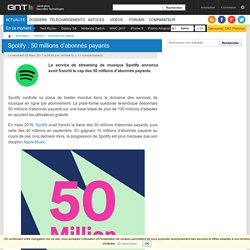
La plate-forme suédoise revendique désormais 50 millions d'abonnés payants sur une base totale de plus de 100 millions d'adeptes en ajoutant les utilisateurs gratuits. En mars 2016, Spotify avait franchi la barre des 30 millions d'abonnés payants, puis celle des 40 millions en septembre. HITS Daily Double : Rumor Mill - WHY IS STREAMING STILL A SECRET? Monday, September 21, 2015 All-you-can-eat, subscription-based streaming might be the best music product of all time.
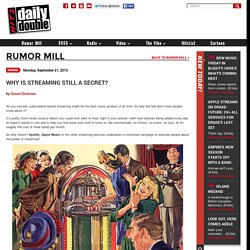
So why the hell don’t more people know about it? It’s pretty much every song or album you could ever want to hear, right in your pocket—with new features being added every day to make it easier to use and to help you find more cool stuff to listen to. No commercials, no friction, no muss, no fuss, all for roughly the cost of three lattes per month. So why haven’t Spotify, Apple Music or the other streaming services undertaken a concerted campaign to educate people about the power of streaming? Recent research finds that 75% of U.S. music consumers listen to music online, but paid online streaming services amount to just 7% of total expenditures on music. Is this because ten clams a month is prohibitive for consumers? This is the celestial jukebox we were promised for so many years, and it might as well be in the Witness Protection Program. Let’s put Apple aside for a moment. Le streaming musical décolle en France. The Music Industry’s 6:1 Ratio. One of the many things that the digital revolution has done to the music industry is to create and accentuate a number of imbalances.
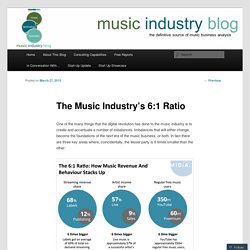
Imbalances that will either change, become the foundations of the next era of the music business, or both. In fact there are three key areas where, coincidentally, the lesser party is 6 times smaller than the other: Digital music revenue share: A common refrain from songwriters and the bodies that represent them (music publishers, collection societies etc.) is that everything starts with the song. And of course it does. Bientôt une estampille « Fairtrade » pour la musique en streaming, High-Tech & Médias.
Alors que la musique en ligne a la réputation de mal payer les auteurs, ceux-ci veulent mettre en avant les sites adoptant une répartition plus juste.
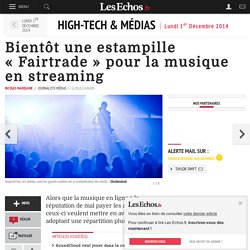
Ifpi : les labels investissent 4,3 milliards de dollars par an dans l'artistique. Publié le mercredi 26 novembre 2014 Version imprimable Musique enregistrée Mardi 25 octobre, l’Ifpi organisait à Strasbourg la soirée Friends of music, pour les députés européens.

Son président, Placido Domingo, en a profité pour dévoiler le dernier rapport de la fédération internationale, Investing in music. Musique : l'Assemblée prolonge la durée de protection des droits des chanteurs. Le projet de loi de transposition, voté à l'unanimité par les députés, doit être maintenant examiné par les sénateurs avant d'entrer en vigueur.
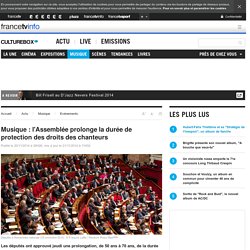
Il protège les interprètes et producteurs d'enregistrements musicaux. Ceux-ci commencent souvent leur carrière jeunes, et de ce fait, la règle actuelle des 50 ans ne leur permet pas de bénéficier du droit d'auteur durant toute leur vie. Une directive sur les "oeuvres orphelines" Le texte transpose une autre directive qui autorise l'exploitation à des fins non lucratives des "oeuvres orphelines". David Byrne calls for transparency from labels and streaming services. David Byrne has called for more transparency from major labels and streaming services, criticising the lack of information regarding how they pay royalties and what percentage of these reach the artists.
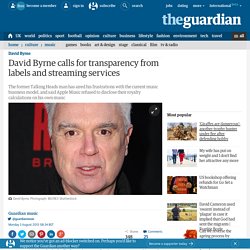
“Many streaming services are at the mercy of the record labels (especially the big three: Sony, Universal and Warner), and nondisclosure agreements keep all parties from being more transparent,” wrote the former Talking Heads man in an op-ed piece for the New York Times. He went on to reveal that he had tried to get Apple Music to break down their royalty calculations over their three-month trial period, only to be told that he would have to get his lawyers involved. “I asked Apple Music to explain the calculation of royalties for the trial period. They said they disclosed that only to copyright owners (that is, the labels). “Before musicians and their advocates can move to enact a fairer system of pay, we need to know exactly what’s going on,” he wrote.
UK music streaming hits high note of 500m songs per week. The revolution in the way we listen to music has passed another landmark, as more than 500m songs were streamed online in the UK in a single week, with Mark Ronson, Ed Sheeran and Rihanna among the most popular artists.
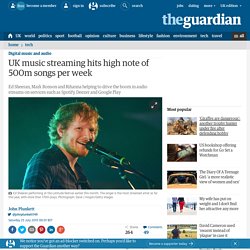
The 505m audio streams in the chart week ending 16 July is the first time the number of weekly streams on services such as Spotify, Deezer and Google Play has topped the half a billion mark – which is nearly double the number of songs streamed a year ago. The boom is despite high-profile royalties disputes involving artists such as Taylor Swift, and concerns about sound quality. Neil Young has banned his back catalogue from streaming, dubbing the audio the “worst quality in the history of broadcasting”. Mark Ronson’s Uptown Funk was the most streamed song in the first half of 2015, played more than 45m times. With 11.5bn streams in the year to date, more than 25bn streams are forecast for the whole of 2015, up from 15bn last year. Why Indie Artists Can't Afford to Skip Streaming: Guest Post.
Tracy Maddux is the CEO of CD Baby, a digital distributor that works closely with independent musicians to get their work on platforms like iTunes, Spotify and Apple Music, among others.
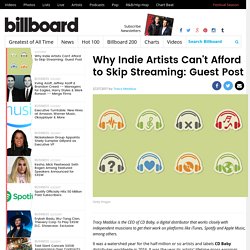
It was a watershed year for the half-million or so artists and labels CD Baby distributes worldwide in 2016. It was the year its artists' lifetime gross earnings crossed the half-a billion-dollar mark (yep, $500,000,000). But the most important trend was that revenue from streaming services like Spotify and Apple Music overtook downloads as the number one source of artists' sales. We're pleased to see that independent artists are now making more money from their music thanks to the growth in streaming. Of all digital revenue, streaming represented only 32 percent of gross earnings in 2015.
In 2016, that ratcheted up to almost half. But other sources of revenue are still important as well -- both to the artist and the consumers whose preference favors other formats.